The smartphone battle: Meet the top contestants
- Published
There is a new contender in the highly lucrative smartphone market: Samsung's Galaxy S3, launched on Thursday in London with great fanfare. But can it stand up to its rivals? We are taking a look at a few of the top phones.
In the world of smartphones, BIG seems to be the new black. Not that today's smartphones are gaining weight. They are slim and light creatures.
Their screens, though, are growing larger and larger. Phone makers clearly want to wow buyers with big images on high-definition screens. The drawback: those with tiny hands will find it difficult to clasp the latest crop of high-end phones.
Tight jeans pockets will also have to make accommodations, although wearers of jackets will be fine.
Alongside the form factor, there is also the battle of the operating systems. Apple and its iOS 5 is facing a vast raft of challengers running Google's Android software - from Samsung to Panasonic and many more.
Nokia, meanwhile, is the standard bearer for Microsoft's Windows Phone operating system.
And lumbering up for what it hopes will be a fresh start is the once-mighty Research in Motion with its new Blackberry 10 software.
So how do some of these rivals square up?
Sony Xperia S
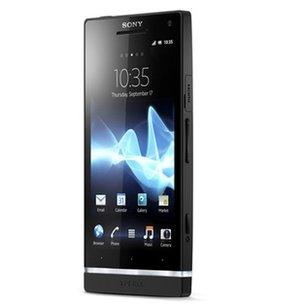
Sony's Xperia S promises to be an entertainment centre
Sony is one of several mobile phone makers trying to revive their fortunes. The company recently ended its joint venture with Ericsson; the Sony Xperia S is its first phone since.
It is a chunky looking phone but feels light (144g), and has both enough processing power and inbuilt memory (32GB) to be an entertainment hub. Its stand-out feature is the 4.3" HD screen, which displays movies and pictures in startling quality. An HDMI cable can connect the phone to HD flatscreen television sets, bringing the phone's HD quality video to the big screen. Once connected, any TV remote control can be used to navigate around the phone's content and applications, from email to music to Twitter - although it's unlikely that many owners will make use of that.
The Xperia S is an Android phone, and Sony is showing restraint in customising the experience. Many manufacturers subject their Android phones to an interface makeover; few succeed in improving the experience.
As with most Sony (and Sony Ericsson) phones, the inbuilt 12 Megapixel camera is a treat, and Sony has copied the Windows Phone experience - adding a shutter button on the side of the phone that quickly launches the camera.
Sony ships the phone with NFC radio tags - put the tags in your car, your place of work, your living room, and when your phone gets near the tag it changes its behaviour; in your car, for example, it may launch the blue-tooth connection for hands-free talking and get the car navigation ready. Cute, but in all likelihood a rarely used gimmick.
Panasonic Eluga
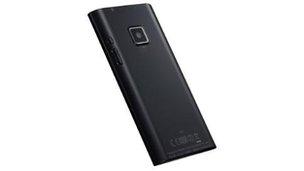
The slim but curvy Eluga marks Panasonic's return to global handset markets
Outside Japan, Panasonic has been absent from the mobile phone market for many years. The Eluga is its Android-based attempt to recapture a share of this lucrative market.
Panasonic executives ooze pride in the company's engineering heritage, and an early pre-production model that I tried is testament to that.
The phone is curvy but very slim (7.8mm), and feels improbably light for its size, a mere 103g despite its 4.3" screen - the same size as the Sony.
That raises the question whether the battery will meet the demands of smartphone power users. Panasonic promises the battery will last the day, not least thanks to some clever energy management software. The 8GB of internal memory may also not be enough for people who want to carry their whole music library with them.
Talking of engineering, as I was shown the phone, the Panasonic exec suddenly grabbed it off me and dunked it in his glass of water. He swirled it around a bit, took it out, dried it and gave it back. Still works, he said. It's also dustproof (but waterproof only to a depth of one metre).
It's a good looking phone, no doubt, but Panasonic's success will depend on persuading network operators to stock it, getting the price right, and convincing buyers that the credentials of its consumer electronics brand once again stretch to the world of smartphones.
HTC One X
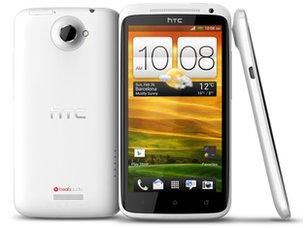
The HTC One X is the largest in the company's new smartphone line-up
Not that long ago HTC was considered the most innovative of all mobile phone makers. Recently the company has faltered, with sales and profits sharply down.
However, the Taiwanese phone maker is attempting a comeback and its new range of HTC One phones has been very well reviewed.
The star of the line-up, the HTC One X, is a whopper of a phone. To reach the on-off button easily may require a thumb extension. The huge 4.7" screen makes it larger than the Sony Xperia S, but it is also very slim (8.9mm) and weighs just 130g.
Unlike the Sony and the Panasonic, it went on sale featuring the latest version of the Android operating system (4.0 Icecream Sandwich - although Sony and Panasonic are both in the process of rolling out an upgrade).
The phone features a fast quad-core processor (except for the LTE version in the United States) and a massive 32GB of memory.
For several years now HTC has been the designer of the best user experience on Android, and the One series continues that tradition. Nearly every action on the phone - from changing settings to using integrated applications - feels a tad easier or more obvious than on other phones.
Despite its slimness, the phone's unibody feels solid and secure, and very pleasing to the touch.
Both on size and on spec, the HTC One X is the closest challenger to Samsung's S3.
Nokia Lumia 900
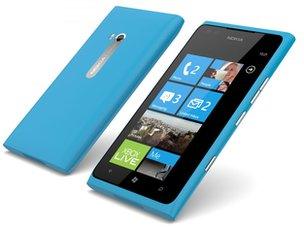
Nokia is betting on Microsoft's Windows Phone 7 software
And now for something completely different. If you are bored with Android phones and don't want to join the iPhone herd, you are quickly going to run out of smartphone alternatives - unless you opt for Microsoft's Windows Phone 7 operating system.
There was a raft of new Windows phones when Phone 7 was launched nearly two years ago, but it's been rather quiet since. The big exception, of course, is Finnish phone giant Nokia, which has bet its smartphone house on the Microsoft software.
This year, Nokia is going both premium with its large Lumia 900 phone, and budget with a promise of a range of cheaper and simpler phones (now that the "Tango" update of Windows Phone is becoming available).
Of all the phones I've seen, the Lumia 900 is the one that feels the most solid and hardwearing (having a gorilla glass screen always helps).
But its 4.3" display is not HD quality, the 16GB internal storage is good but not overwhelming, it's not quite slim (11.5mm) and it weighs a rather hefty 160g. The word "chunky" springs to mind.
Still, it is very speedy, has great battery life, all buttons are placed just right and of all the phones I've played with it's arguably the one that feels nicest to the touch.
The deciding factor when buying this phone (or the smaller Lumia 800) may well be how happy you are with Windows Phone 7. As operating systems go, it's probably the nicest around, with a well-thought-through user interface. Its Achilles heel, however, is the still mediocre quality of available apps. The system software holds a lot of promise, but even now most app developers are still lacking the inspiration to take its user interface principles and make their apps fly.
Samsung Galaxy S3
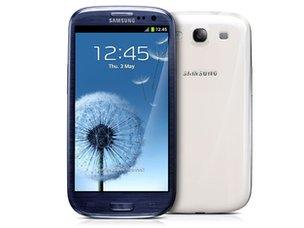
Samsung hopes the S3 will be at least as successful as the S2
And then there is the Samsung Galaxy S3. The Korean phone maker is building on the success of its best-selling S2, and clearly is trying to push well beyond its biggest rival (and key customer) Apple.
A new quad-core processor promises both double the speed and 20% less energy consumption compared to dual-core processors of old.
The phone is in the same "whopper" category as the HTC One X, with its 4.8" HD screen, but just like its rival it is very slim (8.6mm) and weighs just 133g. The 8MP camera is standard, but again software helps to improve the user experience.
With smartphones looking more and more the same, Samsung tries to stand out with functionality and clever software. For example, the phone can be set so that it does not go to sleep as long as the user looks at it.
Voice command programme S Voice promises an Apple Siri-like experience (although this has yet to be put to the test). After taking a picture, the phone will try to recognise the faces of your friends and family, and offer to email the image to them with just one click.
Again, touch is important, with Samsung delivering a similar surface feel as HTC and Nokia.
So if your hands are not too tiny, and you happily live in Google's Android universe, then there is probably not much to choose from between the HTC One X and the Galaxy S3.
Blackberry 10
Is Research in Motion (RIM) the next Palm or the next comeback kid? The marketshare of its Blackberry smartphones (especially at the lucrative premium end) has been plummeting, and its most recent phones have been poorly reviewed.
The company recently gave a preview of its new - dramatically different - operating system, Blackberry 10.
The software certainly looks promising, but by now RIM is notorious for delayed product launches. Coming to market this autumn, RIM may suffer problems similar to Microsoft: it's really difficult to gain traction in such a competitive and fast-moving market, no matter the quality of your product.
Apple iPhone 5
Gadget websites have been buzzing with Galaxy S3 reviews and head-to-head comparisons with other smartphones ever since last week's launch event. Overall, the S3 was deemed to match or trounce all rivals, including Apple's top offering, the iPhone 4S.
Apple may dub its screen a "retina display", but it's relatively small (3.5") and not quite HD, and the glass screen is not particularly shatter proof. Short battery life is the constant moan of iPhone owners, and the user interface may look dated compared to Android's active widgets and Microsoft's live tiles.
However, Apple's iPhone 4S is not the benchmark to beat. Rumours abound that the launch of the iPhone 5 is imminent. If true, and provided Apple can raise (or make consumers believe it raised) its game once more, then Samsung Galaxy S3 and its gaggle of rivals will find it hard to prise consumers from the confines of the iTunes universe.
Don't forget: it's not just about technical spec. Once you have invested heavily in apps that work only on iPhones, you'll find it awfully difficult to leave the world that Steve Jobs built.
- Published3 May 2012
- Published3 May 2012
- Published4 May 2012
- Published27 April 2012
- Published9 April 2012
- Published5 October 2011
- Published27 October 2011
- Published1 May 2012
- Published2 May 2012